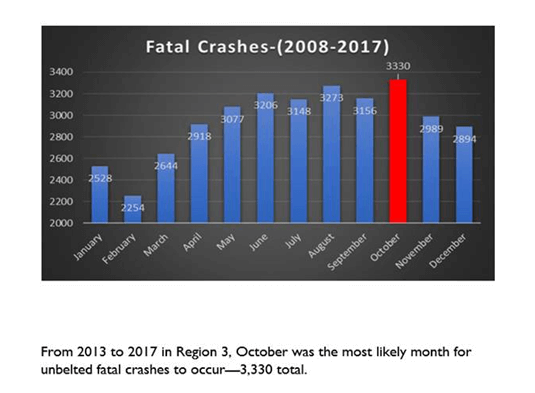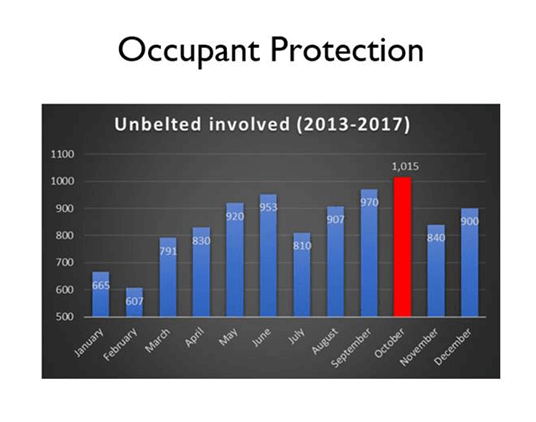According to the Federal Highway Administration (FHWA), an increasing number of Americans are on the road during the month of October. In 2018, October’s total Vehicle Miles Traveled (VMT) was 269.8 billion miles—an 11-billion-mile increase from October 2013.
Excluding summer months (May-August) in 2018, October incurred the highest total of Vehicle Miles Traveled (VMT) for the year.
More driving appears to mean more motor vehicle crashes—at least in NHTSA Region 3 (Delaware, District of Columbia, Kentucky, Maryland, North Carolina, Virginia, and West Virginia).
From 2013 to 2017 in Region 3, October had the highest number of fatal crashes at 3,330. Of these fatal crashes, 1,015 had unbelted occupants involved. That’s nearly 1 in 3.

Of these fatal crashes, 1,015 had unbelted occupants involved. That’s nearly 1 in 3.

Surprisingly, Columbus Day was the 2nd deadliest holiday of 2017 for Region 3, trailing only Independence Day.
What can you do during long trips to help prevent a fatal crash?
- Don’t drive drowsy. Plan ahead and get plenty of sleep the night before. If you feel yourself getting tired, pull over and take a break.
- Buckle up. Make sure that all of your occupants are buckled up and children are in the right seat for their size and age.
- Don’t drive distracted. What is distracted driving? According to NHTSA, distracted driving is any activity that diverts attention from driving, including talking or texting on your phone, eating and drinking, talking to people in your vehicle, fiddling with the stereo, entertainment or navigation system—anything that takes your attention away from the task of safe driving.
- Don’t Speed. The speed limit exists for a reason. Exceeding the speed limit means that you are driving faster than what was intended for that road putting yourself your occupants and others at risk.
- Don’t drive impaired. It’s illegal everywhere in America to drive under the influence of alcohol, marijuana, opioids, methamphetamines, or any potentially impairing drug–prescribed or over the counter. Check your medications to ensure the side effects will not affect your driving in any way. If you are unsure, go to Roadside RX, courtesy of AAA Foundation for Traffic Safety. Roadside RX is designed to help drivers learn more about their medications and how they can affect them while on the roads.
Information from NHTSA and Virginia DMV|Highway Safety Office






